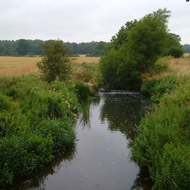
Froglife receives grant of over £470,000 to help their Dragon Finder project
Amphibians and reptiles living along the River Nene in the East of England are celebrating after the Heritage Lottery Fund (HLF) backed a project to conserve their habitats.
Froglife, a national wildlife conservation charity, say that they received a grant of over £470,000 from HLF for their River Nene Dragon Finder project. Over the next four and a half years, residents alongside the river will be brought together to work on improving, restoring and creating over 150 habitat sites for local wildlife.
The International Union of Conservation of Nature (ICUN) recently carried out an assessment of European species and found that 59 per cent of amphibians and 42 per cent of reptiles are in decline. The main threats are habitat loss and disease. Over the last 50 years, one third of the ponds in the UK have disappeared.
Froglife's CEO, Kathy Wormald, commented “We are very grateful to Heritage Lottery Fund for this grant. It will provide Froglife with an excellent opportunity to inspire local communities in the East of England about amphibians and reptiles and their intriguing lives, whilst also introducing people to the many local green spaces on our doorsteps that can be enjoyed by all.
"We’ll be hosting some exceptionally creative activities alongside much needed habitat creation and restoration work. The project will also provide employment opportunities in the region through offering two traineeships who will be trained in public engagement and wildlife conservation.”
Drew Bennellick, Head of Landscape and Natural Heritage at HLF, added: “The recent dramatic decline in the UK’s reptile and amphibian habitats clearly needs to be addressed. We loved the Froglife Trust’s creative solution to this environmental problem. It will give everyone connected to the River Nene – from local farmers to walkers and cyclists – the chance to get involved and learn more about wildlife conservation. The project has the potential to make a real difference in the area and we’ll be watching how it progresses with great interest.”
Image (C) Derek Harper.



 The veterinary mental health charity Vetlife is inviting the veterinary community to join it for a sponsored cold-water dip.
The veterinary mental health charity Vetlife is inviting the veterinary community to join it for a sponsored cold-water dip.